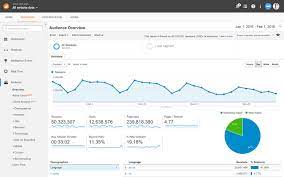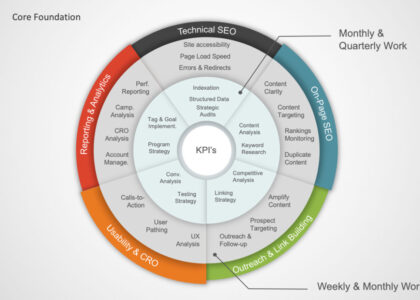The Power of Website Data Analytics
In today’s digital age, where online presence is crucial for businesses, website data analytics plays a pivotal role in understanding user behaviour and making informed decisions. By harnessing the power of data analytics tools, businesses can gain valuable insights into how visitors interact with their websites, enabling them to optimise performance and drive success.
Understanding User Behaviour
Website data analytics allows businesses to track various metrics such as page views, bounce rates, time spent on site, and conversion rates. By analysing this data, businesses can gain a deeper understanding of user behaviour patterns. For example, which pages are most popular, where users are dropping off in the conversion funnel, and what devices they are using to access the site.
Optimising Performance
By identifying areas for improvement through website data analytics, businesses can optimise their websites for better performance. This could involve making design changes to enhance user experience, improving site speed for faster load times, or refining content to better engage visitors. These optimisations can lead to increased traffic, higher conversion rates, and ultimately improved business outcomes.
Personalising User Experience
Website data analytics also enables businesses to personalise the user experience based on individual preferences and behaviours. By segmenting users into different groups and tailoring content or offers accordingly, businesses can create a more targeted and engaging experience for visitors. This personalisation not only enhances user satisfaction but also increases the likelihood of conversions.
Driving Strategic Decision-Making
Ultimately, website data analytics empowers businesses to make strategic decisions based on concrete evidence rather than guesswork. By leveraging data-driven insights, businesses can identify trends, predict future outcomes, and allocate resources more effectively. This strategic approach not only improves overall business performance but also fosters continuous growth and innovation.
In conclusion, website data analytics is a powerful tool that can revolutionise how businesses operate online. By harnessing the insights provided by data analytics tools, businesses can gain a competitive edge in today’s digital landscape and drive sustainable success.
Maximise Website Success: Harnessing Data Analytics for Insightful Decision-Making and Enhanced User Experience
- 1. Gain valuable insights into user behaviour on your website.
- 2. Optimise website performance based on data-driven decisions.
- 3. Personalise user experience to increase engagement and conversions.
- 4. Identify areas for improvement and enhance user satisfaction.
- 5. Make strategic decisions backed by concrete evidence and trends.
- 6. Drive continuous growth and innovation through data analytics.
Challenges of Website Data Analytics: Privacy, Security, Complexity, Cost, and Decision-Making Risks
- Privacy concerns regarding the collection and use of user data
- Potential for data breaches leading to security risks
- Complexity in interpreting and analysing large volumes of data
- Costly investment in advanced analytics tools and expertise
- Risk of making decisions solely based on data without considering qualitative aspects
1. Gain valuable insights into user behaviour on your website.
Website data analytics offers businesses the invaluable opportunity to gain deep insights into user behaviour on their websites. By tracking metrics such as page views, bounce rates, and time spent on site, businesses can understand how visitors interact with their online platforms. This knowledge allows businesses to identify popular pages, pinpoint areas for improvement, and tailor their content to better engage users. Armed with these insights, businesses can make informed decisions to enhance user experience, drive conversions, and ultimately achieve their online goals more effectively.
2. Optimise website performance based on data-driven decisions.
Website data analytics offers the invaluable benefit of optimising website performance through data-driven decisions. By analysing key metrics such as page views, bounce rates, and user behaviour patterns, businesses can make informed decisions to enhance their websites. This could involve improving site speed, refining content, or redesigning elements to create a more user-friendly experience. By leveraging data-driven insights, businesses can continuously fine-tune their websites to maximise performance, increase engagement, and ultimately drive success in the digital realm.
3. Personalise user experience to increase engagement and conversions.
One significant advantage of website data analytics is the ability to personalise the user experience, leading to increased engagement and conversions. By analysing user behaviour and preferences, businesses can tailor content, recommendations, and offers to individual visitors. This personalised approach creates a more relevant and engaging experience for users, increasing their likelihood of interacting with the website and ultimately converting into customers. Through personalisation driven by data analytics, businesses can build stronger relationships with their audience and drive higher conversion rates.
4. Identify areas for improvement and enhance user satisfaction.
Website data analytics is a valuable tool for businesses to identify areas for improvement and enhance user satisfaction. By analysing user behaviour metrics such as bounce rates, session duration, and click-through rates, businesses can pinpoint specific areas of their website that may need attention. Whether it’s streamlining the navigation flow, improving content relevance, or enhancing overall site performance, data analytics provides actionable insights to make informed decisions that ultimately lead to a more satisfying user experience.
5. Make strategic decisions backed by concrete evidence and trends.
Website data analytics empowers businesses to make strategic decisions backed by concrete evidence and trends. By analysing data on user behaviour, engagement metrics, and conversion rates, businesses can identify patterns and trends that provide valuable insights for decision-making. This evidence-based approach allows businesses to allocate resources effectively, predict future outcomes, and implement targeted strategies to drive success. With website data analytics, businesses can move away from guesswork and rely on solid data to make informed decisions that lead to sustainable growth and competitive advantage in the digital landscape.
6. Drive continuous growth and innovation through data analytics.
Website data analytics has the remarkable ability to drive continuous growth and innovation for businesses. By leveraging the insights provided by data analytics tools, companies can identify emerging trends, anticipate customer needs, and adapt their strategies proactively. This proactive approach not only fosters ongoing growth but also encourages innovation by enabling businesses to make informed decisions based on real-time data analysis. Embracing data analytics as a driver for growth and innovation empowers businesses to stay ahead of the curve in today’s dynamic digital landscape.
Privacy concerns regarding the collection and use of user data
Privacy concerns surrounding the collection and use of user data present a significant con of website data analytics. As businesses gather and analyse vast amounts of data to understand user behaviour, there is a growing unease among individuals about the potential misuse or exploitation of their personal information. The risk of data breaches, unauthorized access, and the tracking of sensitive details without consent raises valid privacy issues that must be addressed to ensure transparency and trust between businesses and their users. Balancing the benefits of data analytics with respect for user privacy is crucial in navigating this ethical dilemma in the digital age.
Potential for data breaches leading to security risks
One significant con of website data analytics is the potential for data breaches, which can result in severe security risks for businesses and their customers. Collecting and storing vast amounts of user data for analysis increases the likelihood of cyberattacks and unauthorized access to sensitive information. In the event of a data breach, confidential customer details such as personal information, payment details, and browsing history could be compromised, leading to reputational damage, legal implications, and financial losses for the affected organisation. It is crucial for businesses to implement robust security measures and adhere to strict data protection regulations to mitigate the risks associated with website data analytics.
Complexity in interpreting and analysing large volumes of data
One significant drawback of website data analytics is the complexity involved in interpreting and analysing large volumes of data. With the abundance of data generated by website tracking tools, businesses may struggle to extract meaningful insights and identify actionable trends amidst the sea of information. The sheer volume of data can overwhelm analysts and decision-makers, leading to challenges in drawing accurate conclusions and making informed decisions based on the data. This complexity can hinder the effectiveness of data analytics efforts and impede businesses from fully leveraging the potential benefits of website data analytics.
Costly investment in advanced analytics tools and expertise
One significant downside of website data analytics is the substantial cost associated with investing in advanced analytics tools and expertise. Implementing and maintaining sophisticated analytics solutions can be a financial burden for businesses, especially smaller enterprises with limited budgets. Additionally, hiring or training personnel with the necessary expertise to interpret and utilise complex data sets can further add to the overall expense. This financial commitment may deter some businesses from fully leveraging the benefits of website data analytics, potentially limiting their ability to make informed decisions and optimise their online performance effectively.
Risk of making decisions solely based on data without considering qualitative aspects
One significant drawback of website data analytics is the risk of making decisions solely based on quantitative data without considering qualitative aspects. While data can provide valuable insights into user behaviour and performance metrics, it may not always capture the full context or nuances of user interactions. Focusing solely on numbers can lead to overlooking qualitative factors such as user feedback, emotions, and preferences, which are equally important in understanding the overall user experience. Relying exclusively on data-driven decisions without considering qualitative aspects may result in missing out on valuable insights and potentially making decisions that do not align with the needs and expectations of users.






